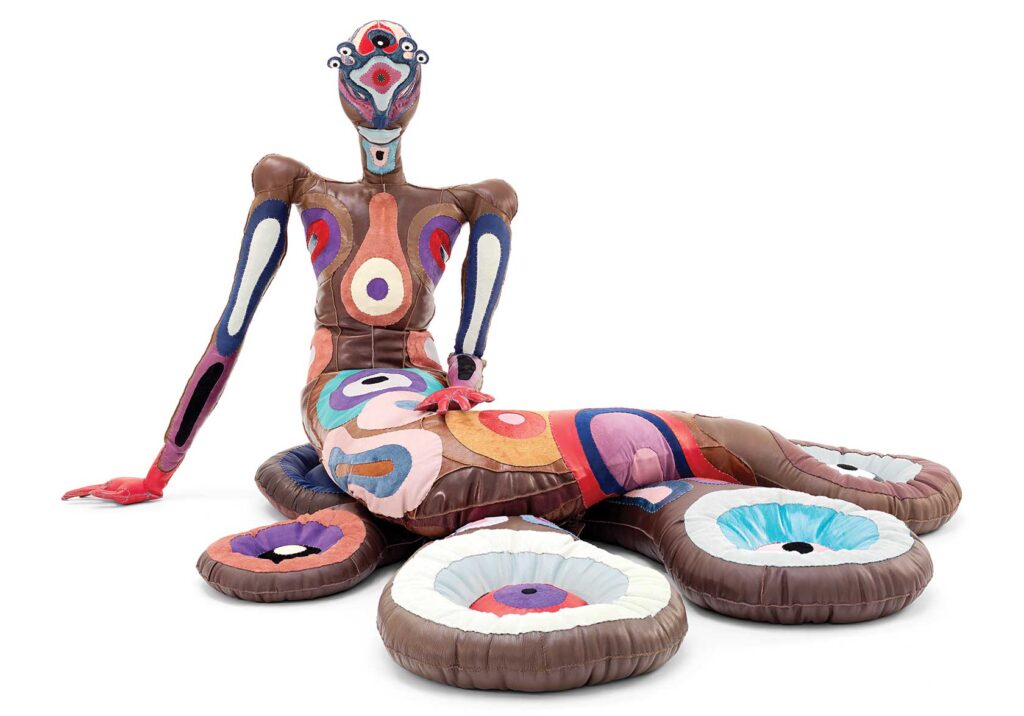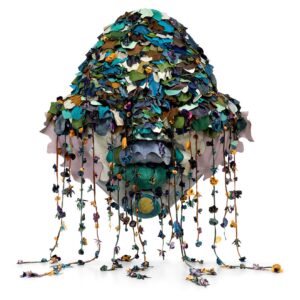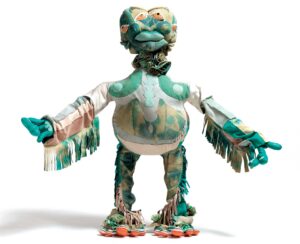
Towering 10-foot sculptural figures draped in intricate fabric garments dominate the “Tau Lewis: Spirit Level” exhibition, newly opened at the ICA. This is the Jamaican-Canadian artist’s first solo museum exhibition in the United States.
Lewis began sewing with found materials at age 8 and has a near-photographic memory cataloging where each key, bead or strip of fabric came from. Many of the items used in the five figures and the floor-bound quilt displayed in this exhibition have personal significance to the artist. She refers to the social, cultural and physical landscapes that she inhabits and collects objects from as “Black geographies.” The figurative sculptures, which aesthetically seem to channel different landscapes, from oceanic and terrestrial to extraterrestrial, may also be the occupiers of these geographies.

“Saint Mozelle,” 2022. Steel, enamel paint, acrylic paint and finisher, recycled leather and
suede, organic cotton twill and coated nylon thread PHOTOS: MARIS HUTCHINSON. © TAU LEWIS
Jeffrey De Blois, the ICA’s Mannion family curator, says, “Lewis harnesses the beauty and power carried by found materials in her monumental soft sculptures. Her sculptures are alive with the energy of previously worn found fabrics and animated through every meticulous gesture. They are intensely personal, yet open to a world of associations and meanings.”
The scale of the figures and their unique hand gestures give a spiritual air to the soft sculptures. Positioned overlooking the floor quilt, they feel like Yoruba orishas overlooking the civilization below. From above, the quilt looks like a beautiful, radiating textile pattern, but crouching closer to it, viewers can spot objects of all kinds within the landscape: keys, washers, microchips, a starfish and more.
Lewis’ work joins rich art historical and Afro-diasporic traditions of upcycling found materials into new worlds. Her work feels particularly in line with the assemblages of Black artists Lonnie Holley (a long-time mentor of Lewis) and Thornton Dial, as well as the quilters of Gee’s Bend, Alabama. Like those famed quilters, Lewis sews her towering garments by hand, hand-dying muslin with tea for a richer color and deconstructing everything from parachutes to leather jackets for material. Giving materials a new life is a transformative and healing experience; Lewis also uses it an act of reclaiming agency.
Though only 30, Lewis has risen quickly in the art world, making strong connections with artists like Simone Leigh and Holley. Lewis’ work has been shown in significant group exhibitions like the 2022 Venice Biennale and the Prospect 5 in New Orleans in 2021.

“The Coral Reef Preservation Society,” 2019. Denim, fabric, plaster and seashells. PHOTO: COURTESY THE ARTIST. © TAU LEWIS
“Tau Lewis: Spirit Level” runs at the ICA through January 20, 2025 and will be accompanied by the artist’s first monograph. Following its Boston run, the show will travel to the David Zwirner gallery in Los Angeles in February 2025.
The lofty sculptures in “Spirit Level” inspire a kind of reverence, for their scale and intricacy but also out of respect for the past lives represented in Lewis’s materials. Many hands and memories have traveled time and space to create this exhibition so that museum-goers can walk away with something completely new.







